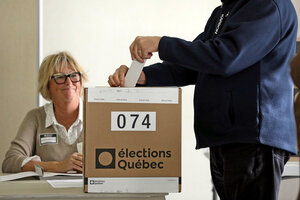Independence’s import wanes in Quebec, but identity still entangles politics

A voter casts his ballot at a polling station in L'Assomption, Quebec, on Oct. 1.
Chris Wattie/Reuters
Gatineau, Quebec
It has been one of the world’s legendary separatist strongholds. Yet in provincial elections in Quebec this month, notions of an independent nation from Canada barely registered here – for the first time in two generations.
In fact, the Parti Québécois (PQ), founded 50 years ago this week to advocate for sovereignty, scored so badly that it lost official party status and the public funding that goes with it.
“Today many Quebecers set aside a debate that divided us for 50 years,” said François Legault, the Coalition Avenir Québec leader who takes power as premier of Quebec later this month. His upstart party’s victory not only upended decades of two-party dominance in Quebec, but also the binary “yes” or “no” choice that the sovereignty debate perpetuated.
Why We Wrote This
Separatism has been on the upswing around the world in recent years. But in long- and famously separatist Quebec, independence was not an issue in provincial elections last week. What happened?
Now, old anxieties over the preservation of language and culture are taking a new shape.
While other independence movements rumble from Catalonia to Flanders, Quebec’s election was seen as pushback against separatist reflexes. Yet Mr. Legault stirred identity politics nonetheless. Among his more controversial promises were to mandate that immigrants take a French and values test, and that public service employees in positions of authority forgo wearing religious symbols.
The election and its results show that while Quebecers may feel settled about their place in Canada, unease around migration – and what that means for their culture – have surfaced. “A lot of that anxiety has been channeled to the immigration issue,” says Jack Jedwab, president of the Association for Canadian Studies in Montreal, “because there's a sense that immigrants are not sufficiently adopting the French language.” He says that perception is mistaken, according to official statistics.
Legault, an ex-separatist from the PQ and former airline executive, made clear he would never hold a referendum on sovereignty while in office, reflecting the political mood in Quebec.
Independence, which failed in two referendums in 1980 and 1995, doesn’t carry the urgency it once did for many voters. Valérie-Anne Mahéo, a guest researcher in the political science department at the University of Montreal, says Millennials in particular, who grew up speaking different languages and meeting people from around the world, don’t see it as a path forward.
They also grew up with strong protections for the French language put in place in 1977. “Some people say we’ve gained so much protection of the French language that it actually hindered the sovereignist movement, that now people, especially young people, do not see the French language as being threatened,” she says.
But current immigration patterns have introduced a new component to the perennial debate. And Quebec, where many refugees have crossed illegally from the US to claim asylum in Canada, is on the front lines. Of 14,125 irregular border-crossers as of August of this year, the vast majority, or 13,479, crossed via Quebec.
Legault tapped into concerns over immigration. He promised in his platform to reduce the quota of those coming to the province by 20 percent, from 50,000 to 40,000 per year. During his campaign he said if new immigrants failed to learn French in three years, with some exceptions, they would not be granted authorization to stay in Quebec – though he later toned down that message since provinces don’t have authority over expulsions. He said he worried that if more is not done to integrate immigrants, “our grandchildren will not speak French.”
Criticized outside of Quebec for ideas that seem contrary to Canada’s welcoming stance on diversity, Legault has also faced accusations of racism at home. In Montreal over the weekend, protesters gathered to condemn his policies on identity and culture. Yet some believe his ideas serve to ensure the sovereignty debate doesn’t resurface.
In an online survey by Vote Compass, published by the Canadian Broadcasting Corporation ahead of the race, 68 percent of respondents said they’d like the Quebec government to do more to protect the French language (compared with 26 percent who said they were satisfied with what the government was currently doing).
Mr. Jedwab says the issue is often stirred up by politicians tapping into angst about language, when in reality Quebec is in the envious position of being increasingly bilingual due to the growth of second-language adoption among both anglophones and francophones. “In fact, those people whose first language is neither English nor French who are resident in Quebec are probably the most trilingual population in North America,” he says.
At the fancifully decorated Bistro Le Forain in Gatineau, on the border with Ottawa, co-owner Laurent Vandeputte sees the efforts to protect French as cultural preservation. “It’s more exotic, in a world that would otherwise be all English,” says Mr. Vandeputte, who was born in Belgium and is multilingual. But he recognizes a political byproduct in training newcomers to speak French: It could “heal” insecurities that drive Quebecers to feel they need their own nation.
Down the street at La petite G’ART, an artist cooperative housed in a former train station, artists Mary McGuire and Jackie Kozminchuk say they are relieved the sovereignty issue is over – for now.
Legault’s ideas are just common sense, and to view it as nationalist is a “narrow vision of Quebec,” says Ms. McGuire, an anglophone who moved to Quebec and had to learn French at age 18. “This is an old policy, he’s just brought it out more. You have to learn French here, or move on.”
Ms. Kozminchuk, a francophone born in Quebec, says she sees French acquisition for immigrants as a win-win. “It makes it easier for everyone,” she says. “And let’s hope the issue of sovereignty is dead.”

